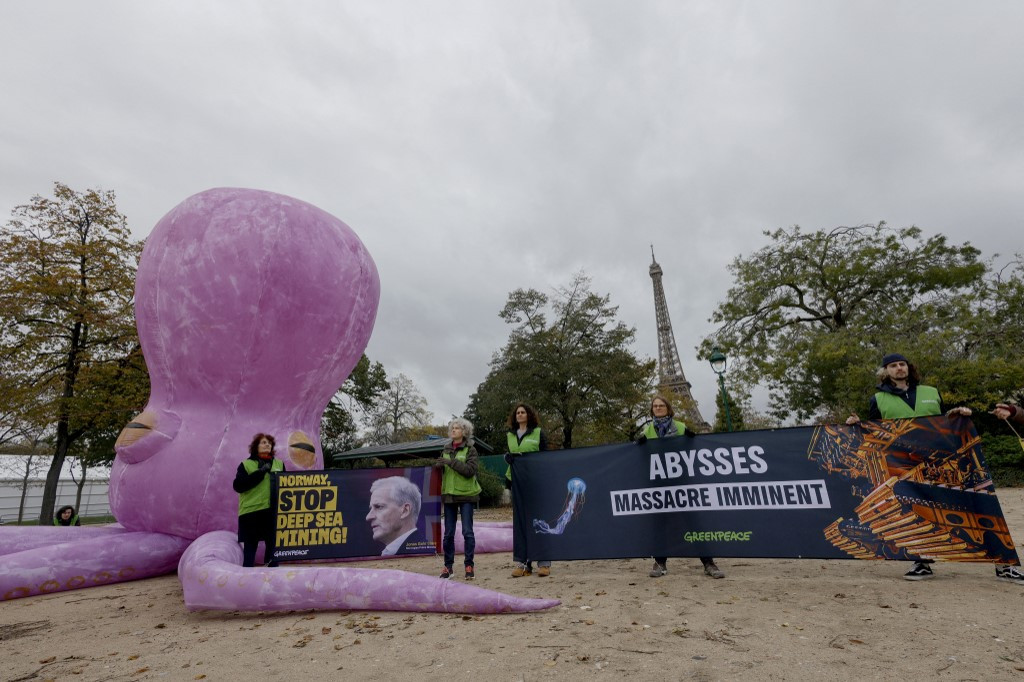Popular Reads
Top Results
Can't find what you're looking for?
View all search resultsPopular Reads
Top Results
Can't find what you're looking for?
View all search resultsNorway suspends deep-sea mining projects: Govt
Norway, Western Europe's biggest oil and gas producer, had planned to become one of the world's first countries to start handing out rights to tens of thousands of square kilometers of seabed.
Change text size
Gift Premium Articles
to Anyone
 Greenpeace activists stand next to a giant Octopus as they demonstrate in front of the Eiffel Tower against the Prime Minister of Norway Jonas Gahr Store's wish to authorize deep sea mining in the Arctic, as he attends the Paris Peace Forum, in Paris on November 10, 2023. (AFP/Geoffroy Van der Hasselt)
Greenpeace activists stand next to a giant Octopus as they demonstrate in front of the Eiffel Tower against the Prime Minister of Norway Jonas Gahr Store's wish to authorize deep sea mining in the Arctic, as he attends the Paris Peace Forum, in Paris on November 10, 2023. (AFP/Geoffroy Van der Hasselt)
N
orway has suspended plans to start giving licenses for deep-sea mining next year that had faced opposition from environment groups and international institutions, a party allied with the centre-left government said on Sunday.
Norway, Western Europe's biggest oil and gas producer, had planned to become one of the world's first countries to start handing out rights to tens of thousands of square kilometers of seabed.
But the small Socialist Left Party said it had blocked the move in return for supporting the minority government's 2025 budget.
"There will be no announcement of exploration rights for deep-sea mining in 2024 or 2025," the party said in a statement.
The energy ministry did not immediately comment on the move. But Prime Minister Jonas Gahr Stoer said it was only a postponement. "We should be able to accept that," he told TV2 television.
Parliament gave approval in January for allowing mining rights for some 280,000 square kilometers of seabed.
The energy ministry later drew up a list of zones covering about 38 percent of this area in the Norwegian Sea and Greenland Sea that would be sold in 2025.
Norway had argued that it did not want to rely on China for minerals essential for renewable energy technology.
It believes there is copper, cobalt, zinc and rare earths in its continental shelf. All are needed for production of batteries, wind turbines, computers and mobile phones.
Deep-sea mining is controversial for its potential impact on vulnerable marine ecosystems. Environmentalists say there is a threat to the habitats of sea species and from potential noise and light pollution from the machinery used, plus a risk of chemical leaks.
The government said there were tough safeguards in its proposals for mining and that licenses could be revoked.
But scientists, non-government groups, some multi-national companies and international institutions such as the European Parliament had opposed the move.
The World Wide Fund for Nature launched legal action against the rights sale last Thursday. It welcomed the postponement in a message to AFP but said it would not halt its court challenge against the legality of the government decision.
Fellow environmental group Greenpeace's head for Norway, Frode Pleym, called the announcement "a crucial win in the fight against deep-sea mining".
"It should be the nail in the coffin for the destructive industry," he told AFP.










